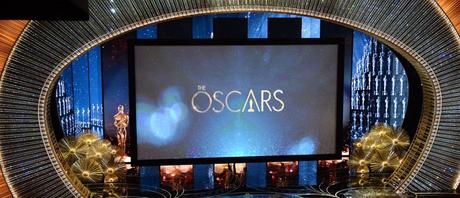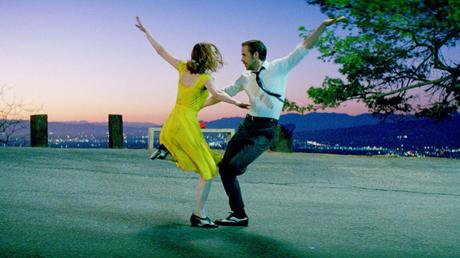
Around halfway through what turned into the longest ( and most memorable) Oscars telecast in a decade, host Jimmy Kimmel threw to a video montage of foreign moviegoers explaining why they love going to movies (short answer: escapism) and gushing about some of their favorite Hollywood films. At this point, such videos are a common feature of Oscar telecasts, serving as a way to both celebrate cinema and highlight the type of films the average person on the street actually likes. Not surprisingly, these random people almost always talk about loving the popular movies most everyone actually cared to see, not the arthouse fare which has a near-exclusive claim to Oscar glory these days.
Screw 'em. People are stupid. After all, America somehow elected Trump. They can have Suicide Squad; we'll just be over here fawning over La La Land, Moonlight and Manchester By the Sea, thank you very much.
Yeah, it's not that simple. There are fewer and fewer of us paying tickets to see Oscar-nominated movies, and fewer and fewer of us who actually watch the Oscar telecast regardless of which films and performers are nominated. The Academy of Motion Pictures Arts & Sciences President Cheryl Boone Isaacs is now like a ship captain stuck perpetually scrambling to plug one leak (e.g., we can't have a three-peat of #OscarsSoWhite) before another one surfaces (e.g., the ratings keep going down, and now we're apparently ageist?).
As such, it's another year, another "How do we fix the Oscars?" argument. However, are the Oscars really broken? And, if so, is there any real fix?
Do the Oscars actually need to be fixed?We're not paying to see Oscar nominated movies the way we used to. This year's nine best picture nominees have grossed a combined $656 million, the second lowest total in any year since the Academy expanded the Best Picture category in 2009. Only 2011, the year of The Artist, The Help and War Horse, had a lower combined box office gross ($628m).
Wait. That can't be right, can it? As has been well publicized, this year's Best Picture nominees include three - Hidden Figures, La La Land and Arrival - which have grossed $100m or more domestic.

Sure, but that's actually been true of just about every year since 2009. The one exception was 2014 when American Sniper was the only nominee to have crossed $100m (it had actually made three times that). In ever other year, there have been at least three $100m+ grossing films, but that's a pretty low bar. For example, in 2009 there were three Best Picture nominees which made at least $200m ( Avatar, Up, The Blind Side).
Not surprisingly, that turned into the second most-watched Oscars (41.62 million viewers) of the past decade. The most-watched was 2014 when 43.74 million viewers tuned in to see Gravity ($274m), American Hustle ($150m), Wolf of Wall Street ($116m) and Captain Phillips ($107m) duke it out for Best Picture (they all lost to 12 Years a Slave). Sadly, the ratings have been in a free-fall ever since, dipping to 37.3 million in 2015, 34.4 last year and 32.9 two nights ago, a 9-year-low.
Is this really a problem? As seen in the chart above, don't Oscar ratings just naturally fluctuate over time? So much of it depends on various factors outside of the Academy's control, such as the political climate of the moment (e.g., last year's telecast was boycotted by some over #OscarsSoWhite, boycotted this year by some Trump supporters) and the general worthiness of the movies Hollywood puts out in any given year.
Even with all of that, year in and year out the Oscars remain the most-watched entertainment program on TV. ABC, which has only the Oscars and NBA Finals in terms of major live event programming, already extended its deal with the Academy through 2028, and even with this year's low ratings the network still reaped $115m in ad revenue (not to mention how much ABC's corporate parent Disney makes from selling the overseas broadcast rights). Plus, ABC finally succeeded in convincing the Academy to let Jimmy Kimmel host (score one for vertical integration!).
Yeah, but compared to last year the rating in the key 18-49 demo was down 16%. Advertisers can't love that.
So what. Isn't pretty much everything on TV down in the 18-49 demo right now? We're all time shifting our viewing, switching over to streaming, and Nielsen ratings are struggling to keep up with the times. Not even live events (other than the Super Bowl) are immune to this shift anymore. As Variety noted, last year's MTV Video Music Video Awards were down 36% from the year before, and NBC's 2016 Rio de Janeiro Summer Games ratings were off 9% from 2012, largely because more viewers were opting for the networks's live-streaming coverage of the various events (which wasn't even an option back in 2012).
Yeah, but 2017's awards shows had reversed the trend, with the Golden Globes, SAG Awards and Grammys all experiencing an uptick in viewership. Why did they rise while the Oscars fell? After two consecutive years of #OscarsSoWhite and now what seems like a full year of Donald Trump's war on Hollywoood, have the Oscars simply become too political?
I know I threw a lot of stats at you with that Infographic. So, let's just focus on the headline: 60% of the 800 respondents couldn't even name a single one of this year's Best Picture nominees. Reuters conducted a similar poll prior to the 2014 Oscars and discovered that among the 1,433 surveyed Americans only 33% had seen at least one of the Best Picture nominees. So, this is nothing new.
Vox found the bright side:
If 60 percent of moviegoers couldn't name any Best Picture nominees going into the Oscars but 70 percent of them planned to watch the ceremony anyhow, then the Oscars function like free advertising for smaller movies. And that's a big opportunity for the nominees - and the potential viewers who might end up checking out a great film they might have otherwise missed.
Blockbusters movies are doing just fine with or without the Oscars. It's the smaller ones which need the help.
The Academy is stuck reflecting a Hollywood which has conceded artistic defeat to TV (and lost a lot of talent to Netflix and Amazon), sold out to China and completely killed the studio-produced, mid-budget drama which used to clean up at the Oscars. The business is now in endless turmoil. Harvey Weinstein was once the king of the Oscar campaign, and now his company is hanging on by the thinnest of threads. And because the Viacom board forced out Paramount's President the next Martin Scorsese film is going straight to Netflix. The Academy can't do anything to fix any of that.
But this doesn't seem sustainable. Can the Oscars really keep getting by with awarding movies which fewer and fewer people are actually paying to see (and don't give me, "Well, they're still nominating blockbusters for tech awards and Best Animated Feature") and expect the ratings to someday rebound?
Moreover, when Honest Trailers and Seth Meyers pretty brilliantly skewer the pomposity of the Oscars within 24 hours of each other and earn viral hits out of the ordeal does that signal a tipping point in the level of cultural respect afforded the same awards show which once saw fit to embrace Crash over Brokeback Mountain?
Are we all kind of busy laughing at the Oscars at this point?
What can be done?What can be done? I want to say "nothing," but that seems too pessimistic. After all, when the Academy was embarrassed by #OscarsSoWhite Cheryl Boone Isaacs didn't throw her hands up and say, "What can I do? We're just an awards show. We don't make the bloody movies." No, she set a new 10-year term limit for existing members, somewhat ruthlessly purged the Academy of older members who hadn't actually worked in the industry in decades and pledged to double the number of women and diverse members by 2020. As Isaacs put it at the time, "The Academy is going to lead and not wait for the industry to catch up." She followed up that talk by inviting 600 new minority members to the Academy in July.
Damn. That woman is getting shit done.
However, the Oscars and other awards like it represent the absolute tail end of the filmmaking process , as Don Cheadle observed at Sundance last year, "People have to have access to tell the stories they want to tell. So what we really need is people in positions to green light those stories, not a hunk of metal."
The focus in that area has understandably been on diversity, but isn't it just as important that the Academy get over its longstanding prejudices against comedies, sci-fi/horror and animation (why was Toy Story 3 the last animated film to be nominated for Best Picture? why wasn't The Witch's truly brilliant cinematography recognized? why did everyone forget about John Goodman's chilling performance in 10 Cloverfield Lane)? On the plus side, the sheer number of nominees for Arrival this year and Mad Max last year are a sign that the barriers against genre films are falling away.

Yesterday, IndieWire asked 6 film critics for their suggestions on how to fix the Oscars, and the suggestions mostly focused on methods for improving the show. Cut the fluff from the telecast and give the winners extra time to talk. Change the rules which govern foreign films (currently, each country's official committee, even ones under government control, chooses the country's one entry for Oscar consideration). Either commit to being an awards show or a variety show, not both. Push harder into live-streaming and a fantasy football-like betting pool.
I'd add to those suggestions to combine sound mixing and sound editing into one category since no one knows the difference. Put the short categories into a separate, perhaps online telecast. Ask The Rock to host. When he says no, shame into it by calling him a jawbone. Warning: you might be body slammed in response. Change the documentary rules to prevent ESPN from ever again gaming the system like it did with O.J.: Made in America.
However, you can tinker with the telecast all you want. If well-known movies aren't in the running for major awards a smoother telecast can only go so far to fix things. Maybe that's okay. Maybe, given the state of the film industry, the Oscars are duty-bound to serve as a PSA for all those movies your film buff friend kept telling you to watch. Maybe it would be an affront to good taste to see something like Rogue One: A Star Wars Story nominated for Best Picture instead of Lion, but it's definitely the movie more people will remember a year from now.
Short of jumping into a time machine and going back to a less Dickensian, haves and have-nots version of Hollywood, there's little the Academy can truly do to fix the Oscars. But, seriously, get The Rock to host next year. That man oozes charisma, and he is just poured into any suit he wears.

